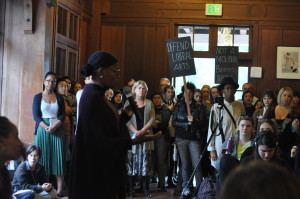OPEN LETTER FROM THE ADJUNCT UNION TO THE MILLS COMMUNITY
From the adjunct bargaining team: Sandra Banks (Chemistry), Bula Maddison (English), and Stephanie Young (English)
We are writing to the Mills community with crucial updates on adjunct union bargaining, including proposed cuts to adjunct faculty that could have significant negative impacts on programs, curriculum and the student experience at Mills.
Half of all faculty members at Mills are adjuncts. We teach more than 1/3 of the curriculum. Most professors whose title includes the word “Visiting,” most lecturers, and most professors of practice are adjuncts. We are paid significantly less than our tenured colleagues. Our total salaries represent only 15 percent of all faculty compensation.
The average full-time adjunct is paid 32 percent less than a beginning tenure-track assistant professor. We want to raise compensation for all adjuncts represented by our union, many of whom have never received a raise despite working at Mills for years.
Our goals are modest: we’ve proposed tiers for compensation in which the pay for adjuncts who’ve taught the longest would be equivalent to the beginning salary for tenure-track faculty. We are not asking to be paid the same as tenure-track faculty; we are asking that adjuncts with the most experience be able to reach the bottom rung of the tenure-track pay ladder.
So we were stunned to receive a counter proposal from the administration that would cut adjunct salaries in 2016-17 by nearly $250,000. Many of our members would receive at least a 20 percent pay cut under this proposal, with others as high as 30 or 40 percent. This comes in addition to already-existing proposals (from both the administration and FEC, not something we can bargain over) to eliminate some 30-50 courses that would be taught by adjuncts in 2016-17. We also received a counter proposal that would reduce the number of adjuncts eligible for health care. These combined cuts increase our potential losses to $600,000 and possibly as high as $1 million.
Such deep cuts would surely mean the departure of adjuncts who could not afford to work for less. It would impact the ability of departments and programs to hire and retain excellent adjunct faculty in the future. The administration’s counter proposal would cap annual pay at $37,500 for adjuncts teaching 5 courses — a full-time teaching load for tenured faculty — which is hardly a living wage in the Bay Area. And yet in her presentation on proposed academic affairs cuts, including 12 percent pay cuts to tenured faculty, the Provost observed that salaries of tenure-track faculty at the assistant professor level should not be cut, so that they might continue to receive a living wage.
The administration has made clear who they think deserves a living wage and who does not. Their disrespectful proposal does not take into account the far-reaching implications such cuts will surely have, not just in one area of the college, but for every department and program where adjuncts teach, advise and mentor students.
Meanwhile the President’s salary grew from $292,126 in 2004 to $502,256 in 2013, an increase of 73 percent. The total cost of the five highest paid administrative positions in 2013, not including the President’s salary, was $1,287,526. We do not understand how, at an institution committed to social justice and equity, such disparity exists between those who serve the College’s central educational missions, and those who have made decisions about its future without faculty input, and on the backs of its most vulnerable members.
We call on the entire Mills community to support us in this struggle. We want to resist divisions between adjunct and tenured, faculty and staff, and some programs or departments against others. Mills is not a zero sum game, or shouldn’t be. It’s a place we share a commitment to: a space of learning, thinking, movement and research. It’s the students. It’s the alumnae. It’s the faculty.



